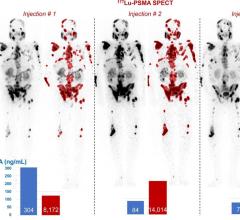June 8, 2011 – Research introduced at the Society of Nuclear Medicine's 58th annual meeting this week may lead to much-needed cardiovascular disease screening for diabetic patients at risk of ischemic heart disease. The disorder is marked by significantly reduced blood flow in the heart. Ischemia of the myocardium can signal diminished oxygenation of the heart tissue and trigger a heart attack if left untreated.
“Diabetes is a serious risk factor for ischemic heart disease,” says Kenji Fukushima, M.D., Ph.D., Tokyo Women's Medical University, Tokyo, Japan. “Most diabetic patients do not exhibit signs of myocardial ischemia and may be on course toward major cardiac events without any red alert. Molecular imaging could potentially provide an effective screening tool for at-risk diabetic patients suspected of having ischemic heart disease.”
According to the American Diabetes Association, approximately 25.8 million children and adults — more than 8 percent of the population — are diabetic and at least twice as likely as nondiabetics to develop heart disease. The link is attributed to the damaging effects of high blood sugar levels on blood vessels. Persistently high blood sugar levels can lead to inflammatory disease and atherosclerosis, or thickening of the blood vessel walls, and eventually myocardial ischemia.
The standard molecular imaging technique is stress myocardial perfusion imaging, which provides information about blood flow in the heart at rest and under stress, either with exercise or with drugs that recreate the physiological changes associated with exercise. However, stress testing may be unsafe for patients at risk of complications or cardiac events. This study explores a method of molecular imaging called myocardial fatty acid metabolism imaging, which may prove to be a safer alternative for patients suspected of having ischemic heart disease.
During the study, a total of 191 diabetic patients were injected with I-123 beta-methyl iodophenyl pentadecanoic acid (BMIPP), a medical isotope bound with an agent that is metabolized by the heart in order to image the fatty acid uptake of heart muscle cells. Once injected, patients were imaged using dual single photon emission computed tomography (SPECT), a molecular imaging technology that captures both physiological and anatomical information about the body. The objective of the study was to test the predictive value of this imaging procedure for major cardiac events, like fatal heart attack, and minor cardiac events, such as hospitalization due to heart failure. Followup of the study revealed 13 major and 25 minor events, proving that I-123 BMIPP is safe and beneficial for predicting the likelihood of cardiac events in diabetic patients suspected of having myocardial ischemia.
This is the first study of its kind detecting ischemic heart disease in diabetic patients without any history of myocardial disease. If moved into clinical use, imaging both cell metabolism and blood flow through the heart could help physicians detect myocardial ischemia and make clinical decisions that could save lives.
For more information: www.snm.org


 February 03, 2026
February 03, 2026 









